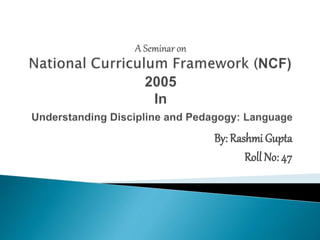
National Curriculum Framework (NCF) Key Objectives and Recommendations
- 1. By: Rashmi Gupta Roll No: 47
- 2. National Curriculum Framework (NCF) is a document seeks to provide a framework within which teachers and school can choose and plan experiences that they think children should have. It address four issues such as educational purpose, educational experience, organization of experience and assessing learner. It differs from curriculum and syllabus. It is only suggestive and provides guidelines on different aspects of education. NCF was introduced in 1975, 1988, 2000 and 2005.
- 3. To remove drawbacks of present school education. Inflexibility of school practice Learning became a isolated activity than life. Schools were discouraging creative thinking. Overall personality development of a child was missing. Child’s present was being neglected for future.
- 4. National steering committee was set up under chairmanship of Prof. Yash Pal and 21 national focus groups. National Focus Groups are: Aims of Education, Teaching English, Teaching Science and so on…. Finally discussed and passed in CABE on 7th September 2005.
- 5. 1. Perspective : Guiding principles 2. Learning and knowledge 3. Curricular areas 4. School and classrooms 5. Systematic reforms
- 6. Strengthening national system of education Reducing curriculum load Curriculum as per constitutional values Quality education for all Connecting knowledge to life outside school Learning is shifted away from routine method. Overall development of child Exam system more flexible and integrated with classroom life Nurturing democratic policy of the country.
- 7. Reorientation of our perception to learner and learning. Child centered pedagogy. Holistic approach to learners development. Adequate room for children’s thoughts, curiosity and questions in teaching. Connecting knowledge across boundaries. Inclusive environment for all in class. Role of teacher as facilitator to provide material, activities and coordinate.
- 8. Learners engagement: experience, making and doing, experimenting, reading, discussion, asking, listening, thinking and reflecting, expressing oneself. Teaching for construction of knowledge: Learners actively construct their own knowledge by connecting new ideas to existing ideas on basis of materials/activities presented to them.
- 9. Construction indicates that learner individually/socially constructs meaning as he/she learns. It happens in collaborations, negotiation, sharing of views. It can be done by allowing students to ask questions, answer in own words, intelligent guessing, asking students to ask questions by listening answers.
- 10. Critical Pedagogy: opportunity to reflect critically on issues in terms of their political, social, economic and moral aspects by open discussion and encouraging and recognizing multiple views. Contextualization of teaching with children’s and local knowledge
- 11. Implementation of three language formula: multilingual education. Teaching math is to develop thinking and reasoning, to visualizing abstractions and formulate and solve problems. Teaching of science is to enable learner to acquire method and process that will nurture thinking process, curiosity and creativity.
- 12. Social sciences to be considered from disciplinary perspective while emphasizing integrated approaches. Art and heritage crafts and health & physical education to form critical components of school curriculum. Education for peace: permeates the entire school life-cum, classroom environment, school management etc.
- 13. Assessment: Integral part of the learning process and benefits both learner and teacher by giving credible feedback. Purpose is to enhance quality of teaching and learning. Assessment is to be a continuous and internal/school based
- 14. School Environment: Colorful, friendly and peaceful, with lots of open space with animals, plants, flower, trees and toys. Class size: not higher than 1: 30. Democratic class room practice. Participation of community members. Participation of all learners in classwork. Policy of inclusion to be followed.
- 15. Textbooks: carefully written and designed, professionally edited and tested, offering not nearly factual information but interactive space for children. Writer focus on elaboration of concepts, activities, spaces for wondering about problems, exercise encouraging thinking and small group work. Thinking for multiple text book.
- 16. Evolving common school system Teaching as professional activity: reflective practice. Teachers should get minimum infrastructure, facilities for better teaching. Locally planned, flexible school calendars and time tables. Academic leadership of principal is related to performance of school.
- 17. Encouraging community participation for enhancing quality and accountability in teacher: PRI In service education of teachers can not be event but process which includes knowledge development and change in attitudes, skills and practice through interaction both in workshop setting and in the school.
- 18. Exam Reform: Shift from content based testing to problem solving and competency based assessment. Exam of shorter duration. Flexible time limits. Guidance and counseling be made a part of school.
- 19. Thanks